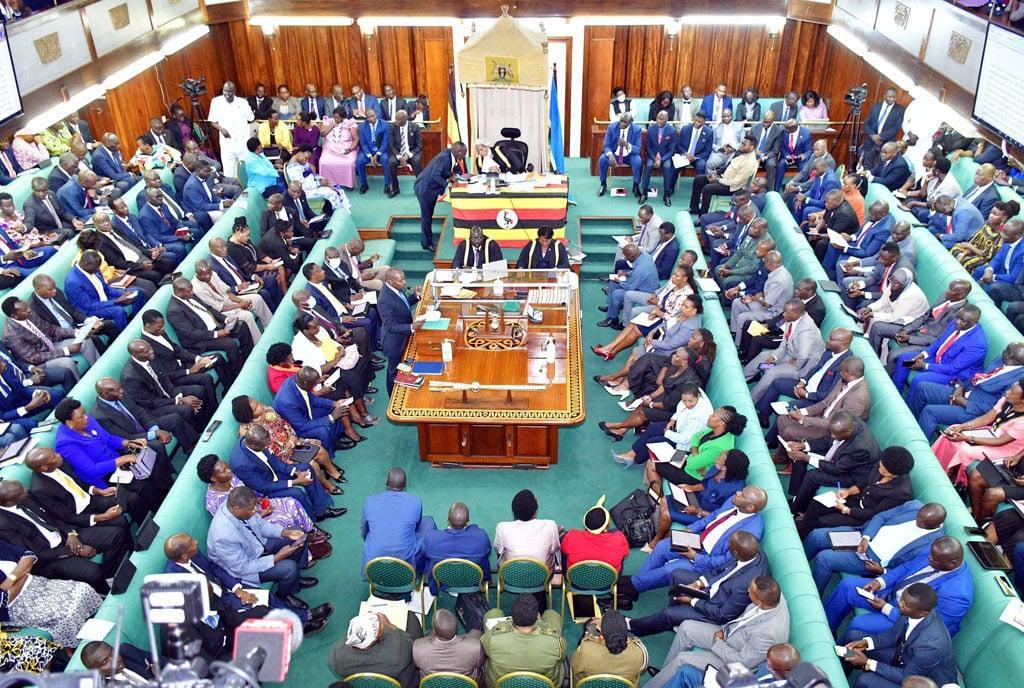Africa-Press – Uganda. In 2008, Uganda’s Supreme Court opted not to remove the death penalty from the country’s statute books. The judgment stemmed from a constitutional petition filed by 417 individuals and Suzan Kigula.
Ms Kigula had been sentenced to death for murdering her husband. After a retrial, the sentence was reduced to 20 years.
Fifteen years on, a constitutional petition challenging the Anti-Homosexuality Act (AHA)—only recently signed into law—has, among other things, directly challenged the death penalty. Section 3 of the AHA prescribes the death penalty for a person convicted of committing the offence of aggravated homosexuality.
Although the US government still has the death penalty on its books for capital offences such as murder, treason, and genocide, Washington was quick to draw attention to the AHA’s provision of a death penalty.
“…failure to safeguard the human rights of LGBTQI+ persons are part of a broader degradation of human rights protections that puts Ugandan citizens at risk and damages the country’s reputation as a destination for investment, development, tourism, and refugees,” said Anthony Blinken, the US Secretary of State, said.
Aggravated homosexuality
As per the AHA, aggravated homosexuality is primarily committed against a child. It can happen when the offender is a parent, guardian or relative of the person against whom the offence is committed. It also happens when a person against whom the offence is committed contracts a terminal illness as a result of the sexual act; when the offender is a serial offender; when the offender is a person in authority over the person against whom the offence is committed; when the person against whom the offence is committed is a person with disability or suffers a disability as a result of the sexual act; and when the person against whom the offence is committed is a person with mental illness or suffers a mental illness as a result of the sexual act.
It also happens when the person against whom the offence is committed is of advanced age; when the sexual act is committed against a person by means of threats, force, fear of bodily harm, duress or undue influence, intimidation of any kind, or through misrepresentation as to the nature of the act; or the person against whom the offence is committed was, at the time the offence was committed, unconscious or in an altered state of consciousness due to the influence of medicine, drugs, alcohol or any other substance that impaired his or her judgment.
Fox Odoi—the West Budama North lawmaker—Frank Mugisha, Pepe Onziema, Jackline Kemigisa, Andrew Mwenda, Linda Mutesi, Kintu Nyago, Jane Nasiimbwa and Paul Bucyana Kwizera—the Kisoro Municipality lawmaker—in a petition, however, contend that the introduction of death penalty for aggravated homosexuality cases violates several international statutes.
The petitioners contend that the death penalty contravenes Section 3 of the Universal Declaration of Human Rights (UDHR), which stipulates that everyone has the right to life, liberty and security of person; Article 6 of the International Covenant on Civil and Political Rights (ICCPR) that recognises and protects the right to life of all human beings; Article 4 of the African Charter on Human and People’s Right that stipulates that human beings are inviolable.
It further stipulates that every human being shall be entitled to respect for his life and the integrity of his person and no one may be arbitrarily deprived of this right. The petitioners also contend that the death penalty contravenes Article 2 of the Convention against Torture and Other Cruel, Inhuman or Degrading Treatment or Punishment, which stipulates that each State Party shall take effective legislative, administrative, judicial or other measures to prevent acts of torture in any territory under its jurisdiction.
Cruel punishment
Additionally, they contend that the death penalty contravenes Article 45 of the Ugandan constitution, which says the rights, duties, declarations and guarantees relating to the fundamental and other human rights and freedoms specifically mentioned in the Chapter shall not be regarded as excluding others not specifically mentioned.
These arguments aren’t new because in Ms Kigula’s case, her lawyers led by Prof Frederick Ssempebwa, argued that the death penalty by itself is a cruel, inhuman and degrading punishment and, therefore, violates Article 24 of the Constitution. Prof Ssempebwa asked the court to nullify the death penalty, citing the 2001 Supreme Court decision of Salvatore Abuki vs the Attorney General in which the country’s apex court quashed Section 7 of the Witchcraft Act.
The section provided for the banishing of the person. The court heard that the provision was wrong, torturous, cruel, and inhuman. The punishment was also deemed to be in contravention of articles 24 and 44 (a) of the Constitution.
Interpreting what amounts to “cruel, inhuman and degrading punishment”, Prof Ssempebwa argued that if the case of banishment was found to be cruel, then the death penalty—which is much severe—must also be seen through the same lens.
Prof Ssempebwa also relied on the Tanzania Case of Republic vs Mbushu where the death penalty was adjudged to be “cruel, inhuman and degrading.” He also banked on the 1995 South African case of the State vs Makwanyane, where the court considered provisions in the South African Constitution similar to Article 24 of the Uganda Constitution and declared the death sentence to be cruel, inhuman and degrading.
The State insisted that the death penalty as provided for in Article 22(1) was constitutional in Uganda. The Article stipulates that “no person shall be deprived of life intentionally except in execution of a sentence passed in a fair trial by a court of competent jurisdiction in respect of a criminal offence under the laws of Uganda and the conviction and sentence have been confirmed by the highest appellate court.”
Verdict
In determining the case, Justices Benjamin Odoki, John Wilson Tsekooko, Joseph Mulenga, George Wilson Kanyeihamba, Bart Katureebe, Christine Kitumba and Frederick Egonda Ntende started from what appears to be a common position. This was the right to life that they all agreed is the most fundamental of all rights. The taking away of such a right, they reasoned, is a matter of great consequence. It deserves, they added, serious consideration by those who make constitutions, as well as those who interpret those constitutions.
“One must also bear in mind that different constitutions may provide for different things precisely because each constitution is dealing with a philosophy and circumstances of a particular country,” the justices said, adding that there are common standards of humanity that all constitutions set out to achieve.
The death penalty, according to the Ugandan Supreme Court, appears to have existed since time immemorial. Sometimes, the seven justices said, it was arbitrarily imposed and carried out in all sorts of manners—take burning on the stake, crucifixion, beheading, and shooting.
“During World War II, the crimes committed by the Nazis in Germany whereby millions of people were put to death, clearly shocked the world,” the justices said, adding that this was one of the reasons why the Universal Declaration of Human Rights was adopted and proclaimed by the United Nations General Assembly on December 10, 1948.
Review process
The Constituent Assembly (CA) that midwifed Uganda’s current constitution and the Constitutional Review Commission, which travelled the width and breadth of Uganda, considering people’s views on various aspects of the Constitution, looked into the subject of the death penalty.
The Constitutional Review Commission, which was headed by Justice Odoki, came to the conclusion that the death penalty should be retained.
“We have seriously considered arguments of both sides, critically analysed the international attitude to capital punishment, the praiseworthy campaign of Amnesty International for the abolition of the death penalty and consideration of the fact that the death penalty has been abolished in several countries, including a few African countries,” the Commission started, adding: “We fully understand the need for a change of attitude to capital punishment. We have, however, not found sufficient reasons to justify going against the majority views expressed and analysed.”
The Commission then recommended thus: “Capital punishment should be retained in the new Constitution; Capital punishment should be the maximum sentence for extremely serious crimes, namely murder, treason, aggravated robbery, and kidnapping with intent to murder; It should be at the discretion of the courts of law to decide whether a conviction on the above crimes should deserve the maximum penalty of death or life imprisonment; The issue of maintaining the death penalty should be regularly reviewed through national and public debates to discover whether the views of the people on it have changed to abolition or not.”
With that background, the Supreme Court justices in the Kigula case said the framers of the Constitution were also aware of the numerous instances of torture and other cruel punishments that had characterised Uganda’s recent history.
“They seem to have come out on these two aspects of our history and dealt with them by providing that life is sacrosanct and may only be taken away after due process up to the highest court, and after the President has had the opportunity to exercise the prerogative of mercy,” they said.
Though Kigula’s lawyers had insisted that there was a conflict between articles 22(1), which gives the green light to the death penalty, and 44(a), which guarantees freedom from torture, the justices didn’t agree.
“Article 44(a) was not meant to apply to Article 22(1) as long as the sentence of death was passed by a competent court after a fair trial and it had been confirmed by the highest appellate court. Such a sentence could not be torture, cruel or degrading punishment in the context of Article 24,” they noted, adding that had the framers intended to provide for the non-derogable right to life, they would have so provided expressly.
“But in light of the history and background they had at the time, it is clear to us that the effect and purpose of the two provisions were to treat the right to life with qualification but with the necessary safeguards, while totally outlawing all other forms of torture, cruel and degrading punishments as had been found to have taken place in Uganda,” they said.
Last death penalty victim
Uganda last hanged death row convicts in 1999 when President Museveni sanctioned the hanging of Musa Ssebirumbi, a former operative of the National Security Agency under Milton Obote, together with 27 others who had been found guilty of murdering three individuals.
Although Mr Museveni has since been reluctant to sanction a death warrant, in 2018, he said hardcore criminals had tested his patience.
“I believe this lenience is becoming a problem. I’m going to revise this and hang a few. We must hang some of these people because if you see how they kill people, they deserve to be killed,” Mr Museveni said while presiding over a pass out ceremony of prison warders.
For More News And Analysis About Uganda Follow Africa-Press






